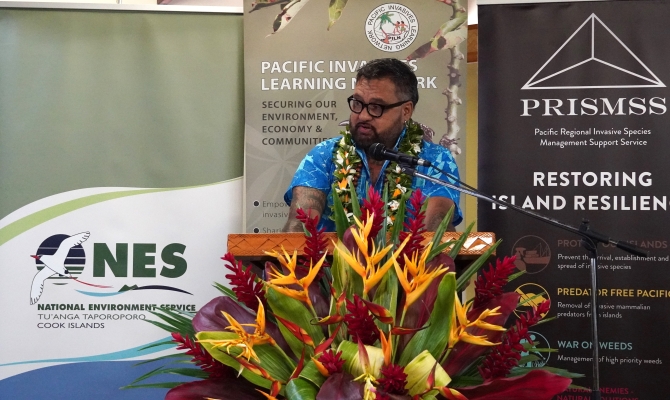
12 August 2024, Rarotonga Cook Islands – Over 70 invasive species professionals and practitioners from across the Pacific region have converged in Rarotonga as part of the Pacific Invasive Learning Network (PILN) sixth meeting hosted by the Government of Cook Islands 12-16 August.
This event will enable participants to share and celebrate their successes, identify possible sustainable solutions to challenges, address critical issues related to invasive species management and discuss ways to invigorate future networking and collaboration between our Pacific islands in sharing technical expertise, information, and successful management approaches.
“Every day, our island nations are fighting unseen battles on the frontline against a vast range of invasive animal and plant species, one of the leading threats to biodiversity and island ecosystems, with the potential to have catastrophic effects on agriculture, food security and human health”, said the Honourable Albert Nicholas, Deputy Prime Minister and Minister for Environment of the Cook Islands.
“Fortunately, the relatively small size and isolation of most of our island homes also offers many opportunities to prevent new invasions and eradicate existing pest species.”
The Hon Deputy Prime Minister during his opening remarks also mentioned that this year’s biodiversity theme and call for action is to “be part of the plan”, and efforts to be more focused on initiatives in the pursuit of halting and ultimately reversing biodiversity loss.
“My interpretation of this is that we cannot be complacent, and we all have a role to play in protecting our endemic species and food resources and must have a plan to effectively put nature on a path to recovery”.
“This also requires significant investment in controlling invasive species on islands, which will assist in providing benefits to critical ecosystems for local communities, food security, protection of native biodiversity, natural resources and for activities like ecotourism”.
The sixth PILN meeting objectives are focused on sharing success stories and case studies on invasive species management by our Pacific Islands and discuss ways to increase on-the-ground technical support and promoting best practices and successful management approaches as a region.
The event will also enable participants to learn more about invasive species management in the Cook Islands through site visits, including their culture and celebrating our success and discuss ways to invigorate future networking and collaboration between Pacific Islands in sharing technical expertise, information, and successful management approaches.
The NES Director during his keynote address informed participants that as invasive species and the various interventions may change certain natural ecosystems, there needs to be a better understanding that these are difficult tasks that cannot be taken for granted and acknowledged all the invasive species warriors in the Pacific for taking on the battle to effectively control invasives species.
“As we’re confronted by the triple planetary crisis of climate change, nature and biodiversity loss, and pollution, this week’s networking is a good reminder to us, that invasive species is one of the key drivers of biodiversity loss and we recognise invasive species as a significant threat to native species and notes robust systems for detecting pest and management of biosecurity is required both inter-island and into the Cook Islands,” said Mr Halatoa Fua, Director, National Environment Service (NES).
“We also acknowledge the invasive species threat to food security as an important aspect of our agenda as small islands developing states. Biosecurity is a crucial step for us, as we’ve seen invasive species such as fruit flies can destroy a nation’s agricultural food production and export industry”.
The first PILN meeting was held in Palau in 2006 with the fifth meeting held in Samoa in 2023. This sixth meeting will provide the opportunity to participants to talk with like-minded practitioners on new methods and address common issues for further assessment, investment, and resolution.
PILN’s mission is to empower effective invasive species management through a participant-driven network that meets priority needs, rapidly shares skills and resources, provides links to technical expertise, increases information exchange, and accelerates on-the-ground action.
Mr. David Moverley, the SPREP Invasive Species Adviser, accepted the Cook Islands Vaka on behalf of the PILN from the Honourable Deputy Prime Minister of the Cook Islands as the Cook Islands officially joined the network, leaving only a few Pacific countries, territories and states yet to join the initiative.
Another highlight of this year's PILN meeting will be the celebration of the "Battler of the Year" award, which recognises the dedication and commitment of Invasive Species Battlers from the Pacific region and a field trip to understand how Cook Islands is using biocontrol agents as part of the Natural Enemies Natural Solutions (NENS) programme coordinated by the Pacific Regional Invasive Species Management Support Service (PRISMSS) with the New Zealand Landcare Manaaki Whenua Research, against African tulip tree, mile-a-minute, red passionfruit, grand balloon vine, Lantana and Leucaena species.
The Pacific Invasive Learning Network (PILN) connects Pacific professionals and practitioners to share knowledge, expertise, tools, and ideas that are vital to managing invasive species effectively. PILN enables multi-disciplinary country teams to work together on strategies with critical input from other national teams and experts from throughout the region, resulting in a common vision and a plan for effective conservation action.
National PILN Teams bring together national agencies responsible for invasive species management, including those responsible for agriculture, natural resource management, international trade and border control, as well as environment and conservation.
The PILN meeting is made possible with funding support from the Global Environment Facility funded GEF 6 Regional Invasives Project, the European Union funded PROTEGE project, the New Zealand Government funded Managing Invasive Species for Climate Change Adaptation in the Pacific (MISCCAP) project, and supported by the Secretariat of the Pacific Regional Environment Programme (SPREP) through the PRISMSS programme.
For further information please contact:
Mr Nitish Narayan, PRISMSS Communications & Liaison Officer on nitishn@sprep.org
Learn more about PRISMSS www.sprep.org/invasive-species-management-in-the-pacific/prismss